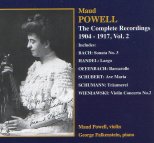Maud Powell’s pre-electric discography comprises some three-and-a-half hours of mainly salonesque encore repertoire. This material has been circulated previously on three CDs released in the late 1980s by the Maud Powell Society. Ward Marston’s transfers eliminated much extraneous surface noise, but his newest restoration of these vintage masters realizes additional gains, not least of which is that Powell’s distinctive tone (notable for its muscularity, the bow always working solidly into the string, and tightly modulated vibrato) now can be more closely evaluated. Powell (1867-1920), who’d heard and written enthusiastically about the young Heifetz, had a style that was far more old-world–hence the frequent glissandos, vocalized finger substitutions, and rather effortful ornamentation in Baroque works, all of which can be heard in these performances.
This collection opens with two Allegros from Bach’s E major sonata. Powell’s earnest, spirited playing brings surprisingly firm tone and scant vibrato, though the Handel Xerxes “Largo” is done in the more sentimentalized manner of the period. It’s revealing to compare her accounts of Vieuxtemps’ Op. 38 Polonaise or the Capriccio Waltz by Wieniawski with early Heifetz recordings. Such evaluation highlights the modernity of Heifetz’s playing. It’s not that Powell’s more indulgent manner infers any lack of virtuosity, but rather that Heifetz already was in a different league!
There are some long-forgotten gems here, and Powell’s performances of Poldini’s “Dancing Doll” or Cadman’s “Little Firefly” are delightful reminders of a style of violin playing that would have been widely emulated 80-odd years ago. Interestingly, Powell doesn’t over-romanticize Raff’s “Cavatina”, and she plays the “Barcarolle” from Offenbach’s Hoffmann pretty straight as well. The violinist’s own arrangement of Martini’s song “Plaisir d’amour” is one of the most endearing tracks on this valuable retrospective.
































